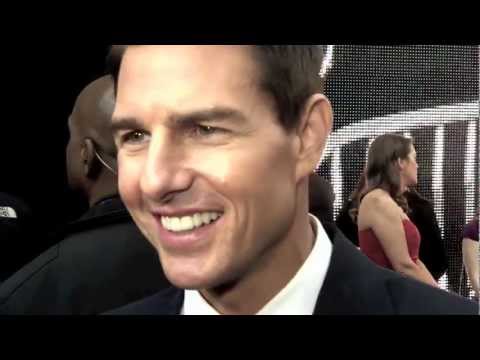From 2004, and the premiere of “Collateral” in Harlem, this was pre Katie Holmes:
Maybe you had to be there early yesterday evening on 124th St. and Frederick Douglass Boulevard to believe it: Tom Cruise, Hollywood’s boy-wonder superstar, lost in a crowd of black fans, signing autographs like he was Reverend Al Sharpton.
Of course, what makes Cruise such a big movie star is that his popularity cuts across racial and class lines.
This could not have been clearer than on the block behind the Magic Johnson Theater, where DreamWorks had set up a long red carpet and Oscar ceremony-style bleachers for the premiere of Cruise’s new movie, “Collateral.”
Why Harlem? “Collateral” was the opening-night film at the UrbanWorld Festival, which is mainly for black filmmakers. Michael Mann — who created “Miami Vice,” directed “Ali,” “The Insider” and “Heat” — is not black, but the other stars of “Collateral” are Jamie Foxx and Jada Pinkett Smith. Thus, the qualification.
For a solid 90 minutes at dusk in Harlem, Cruise worked that crowd, signing everything that was put in front of him: old magazine covers, movie posters, even a dollar bill.
When he was pulled away to do press on the red carpet, the scorned crowd would shout, “Tommy! Tommy!” And then Cruise, accompanied by his sister/publicist Lee Ann Mapother, would go right back and pick up where he left off.
If he’d been running for office, he would have won.
Not to be outdone, petite Pinkett Smith, in a slinky dress, did the same thing, rushing to greet fans and giving less attention to the media on the carpet. At one point she ran over to a group in the bleachers, without her famously attentive publicist or even a security guard in tow, and dove right in. The fans went wild.
Meanwhile, director Mann gave his red-carpet interviews accompanied by a sunny-looking older woman with blond hair and a big grin.
This was legendary publicist Pat Kingsley, who recently dropped Cruise as a client after 14 years, and no longer has to run after him or keep a watchful eye over him. The result is that she looks a decade younger. She even removed her jacket in the humid summer air, a Kingsley first.
But “Collateral,” even with Tom Cruise at its command, belongs to Jamie Foxx. This is the year of the Foxx, you know.
He stars in the upcoming “Ray,” about Ray Charles, and will likely get a Best Actor nomination for it. There’s a good chance he’ll also be in the Best Supporting Actor category for “Collateral,” in which he plays a nerdy cabdriver who gets pressed into service as getaway driver for a hit man (Cruise). Foxx nails every bit of this role, holding on even when the movie itself gets a little sketchy.
Happily, I can report that Foxx’s biggest fan at last night’s screening — which started an hour and 10 minutes late and was followed by a rat-cluster of a party that yours truly skipped for fear of being trampled — was … Jamie Foxx.
He sat through the whole film, clapped, laughed, shouted out and had a grand time watching himself on screen. He has good taste.
Most actors don’t like to watch themselves on screen, but Foxx seems to have no such inhibition. Only a few times did he check his cell phone for messages while the film wound along.
HBO is a sponsor of UrbanWorld, and right before the screening it treated us to a promotional clip for the network, featuring every black actor on their shows, as well as James Gandolfini and Edie Falco from “The Sopranos.”
I don’t know if this was a contractual thing or if the marketing department says “The Sopranos” has a black audience, but it was interesting from a cultural perspective to see how the cable studio pitches itself to a “niche” audience.
What of “Collateral”? Michael Mann returns to his “Miami Vice” moodiness in this one, with gorgeous cinematography, a moody soundtrack and an overall stylish, edgy feel that should make the film a hit.
All the acting is good — Cruise is underrated as the robotic, existential hit man. (The movie is essentially a two-character play.)
Ironically, “Collateral” winds up on a commuter train, bringing Cruise’s career full circle from the ending of “Risky Business” in 1982. Maybe that’s a good thing, because he’s got to go to another level next or risk getting stale. Something tells me he won’t let that happen.
Read more: http://www.foxnews.com/story/0,2933,128082,00.html#ixzz20L4ZpK9Z

